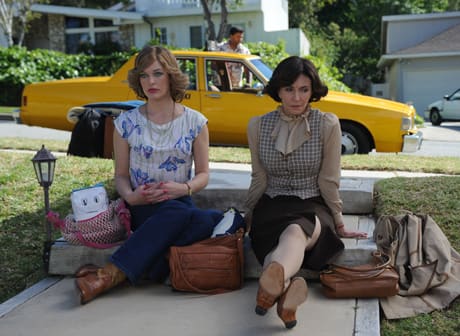Early on in this road movie/teen comedy/period piece hybrid about the unlikely friendship of a promiscuous girl and an obese homosexual, Danielle (Juno Temple) – the titular "dirty girl" – and Clarke (Jeremy Dozier) brainstorm name suggestions for the bag of flour they have to raise as a child for Life Skills class. When Danielle suggests Joan, Clarke excitedly exclaims, "like Joan Crawford," like any good stereotype. Acknowledging this and rolling her eyes, Danielle delivers a hilarious rant questioning whether the amount of times a gay man takes it from behind is directly proportionate to his tendency to say crap like that. It's completely inappropriate and politically incorrect, but also bang-on and surprisingly inoffensive.
This is simultaneously the charm of Juno Temple's slutty, tactless, yet strangely empowered, character and Dirty Girl itself; it doles out offensive and abrupt dialogue, along with some less than savoury implications about parental roles, but has the heart to make it all work.
Taking place in the '80s, with songs by Bonnie Tyler, Bananarama and Belinda Carlisle crowding an oft-amusing, and appropriate, soundtrack, the movie starts with Danielle being punished at school with remedial classes after asking her abstinence-preaching Sex Education teacher what to do when a guy rudely ejaculates all over your dress. There, she forms a unique bond with the socially toxic, closeted, overweight Clarke, whose struggles with his homophobic, abusive father (Dwight Yoakam) mirror her feelings of rejection in not having a father at all.
Because they bond over their status as outcasts, rebelling against their misunderstood, but caring, mother figures (Milla Jovovich and Mary Steenburgen), while preoccupied with garnering male attention, their unspoken connection carries the trajectory of the film. The ensuing road trip to find Danielle's biological father acts as a mutual coming-of-age parable, where comedy and heartache confirm both the beauty and disappointment of adult realities. Contextualizing the '80s period, it also represents a generation of children from non-traditional families forming an identity without standard male role models.
Despite struggling a little bit in managing the balance between reality and some of the exaggerated fantasy elements, there's an abundance of sincerity and human truth, along with some feathered hair and Flashdance gay bar stripteases. Indie comedies don't get much better than this.
(Ideal)This is simultaneously the charm of Juno Temple's slutty, tactless, yet strangely empowered, character and Dirty Girl itself; it doles out offensive and abrupt dialogue, along with some less than savoury implications about parental roles, but has the heart to make it all work.
Taking place in the '80s, with songs by Bonnie Tyler, Bananarama and Belinda Carlisle crowding an oft-amusing, and appropriate, soundtrack, the movie starts with Danielle being punished at school with remedial classes after asking her abstinence-preaching Sex Education teacher what to do when a guy rudely ejaculates all over your dress. There, she forms a unique bond with the socially toxic, closeted, overweight Clarke, whose struggles with his homophobic, abusive father (Dwight Yoakam) mirror her feelings of rejection in not having a father at all.
Because they bond over their status as outcasts, rebelling against their misunderstood, but caring, mother figures (Milla Jovovich and Mary Steenburgen), while preoccupied with garnering male attention, their unspoken connection carries the trajectory of the film. The ensuing road trip to find Danielle's biological father acts as a mutual coming-of-age parable, where comedy and heartache confirm both the beauty and disappointment of adult realities. Contextualizing the '80s period, it also represents a generation of children from non-traditional families forming an identity without standard male role models.
Despite struggling a little bit in managing the balance between reality and some of the exaggerated fantasy elements, there's an abundance of sincerity and human truth, along with some feathered hair and Flashdance gay bar stripteases. Indie comedies don't get much better than this.




